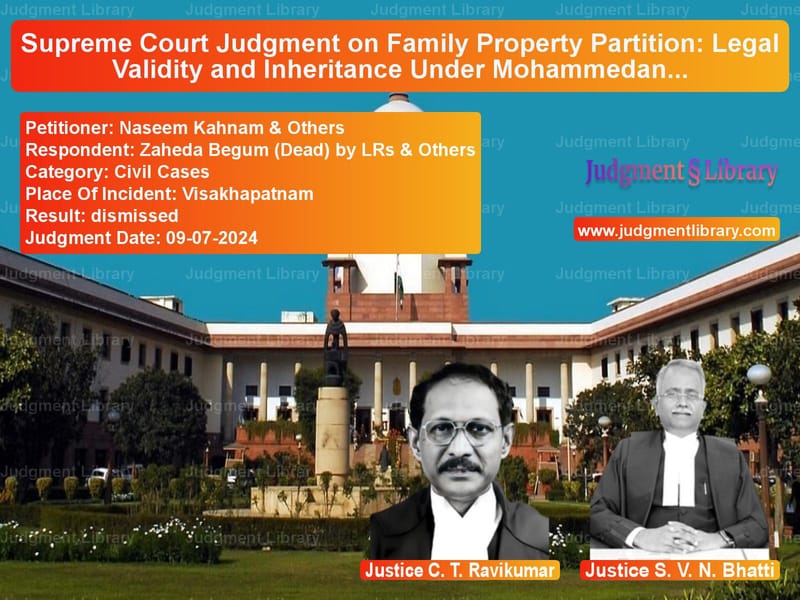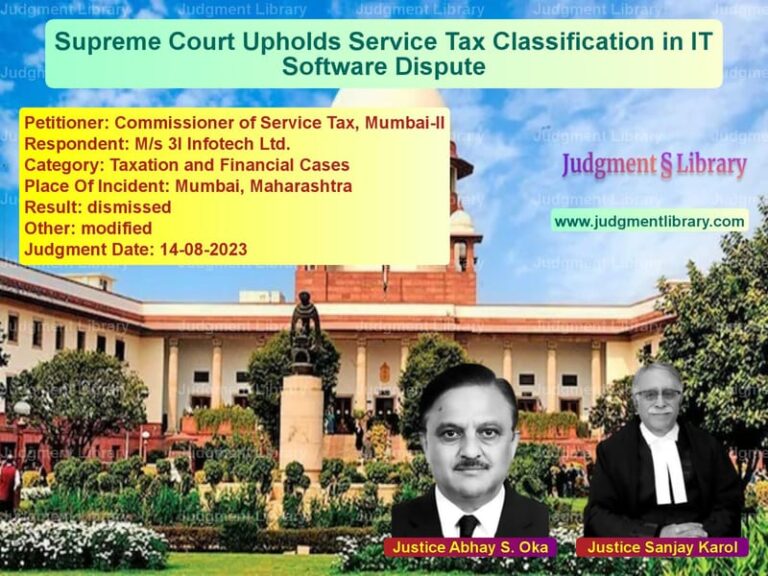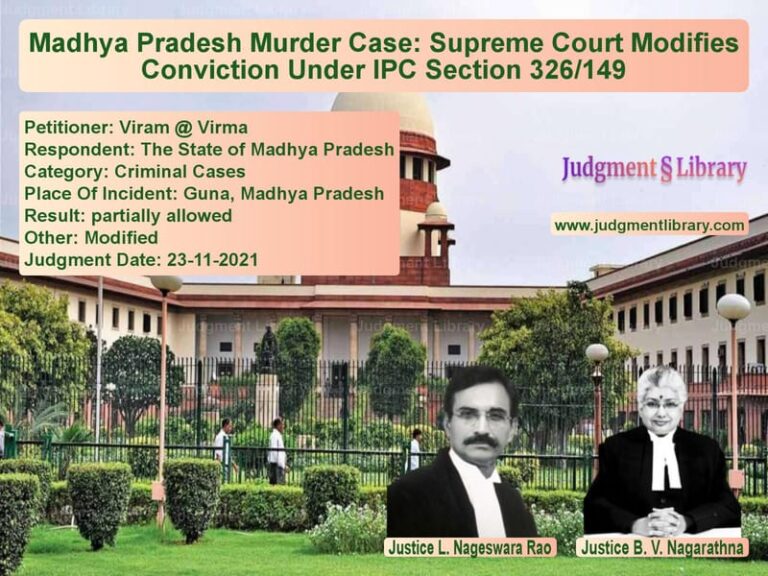Supreme Court Judgment on Family Property Partition: Legal Validity and Inheritance Under Mohammedan Law
The case of Naseem Kahnam & Others vs. Zaheda Begum (Dead) by LRs & Others was a significant legal battle concerning the partition and inheritance of a family property. The dispute arose over the legal validity of a family settlement agreement (Exhibit-A6) and its enforceability under Mohammedan Law. The Supreme Court of India examined whether the agreement was valid, whether it could override succession laws, and whether the rights of a niece in the property could be legally upheld.
Background of the Case
The case revolved around a residential property located in Visakhapatnam, originally owned by Late Ghouse Khan. He had acquired the property through a lease-cum-sale agreement with the Visakhapatnam Urban Development Authority and later purchased it through a registered sale deed. Upon his demise in 1988, the ownership of the property became a contentious issue among his legal heirs.
As per Mohammedan Law, the immediate legal heirs of Ghouse Khan were his surviving siblings. However, Plaintiff No. 2, the niece of the deceased, claimed a share based on a family settlement agreement (Exhibit-A6) executed in 1992. According to this agreement:
- The western half of the property was to be given to Plaintiff No. 2.
- The eastern half was to be divided among Plaintiff No. 1 and the Defendants (siblings of the deceased).
The dispute arose when Defendant No. 2 challenged the validity of the agreement, claiming that it was fabricated and unenforceable under the law. Defendant No. 2 contended that as per Mohammedan Law, Plaintiff No. 2 had no inheritance rights, and the agreement was an attempt to unlawfully acquire a share in the property.
Trial Court Proceedings
The case was first heard in the Principal District Court, where the trial court examined the validity of Exhibit-A6. The plaintiffs contended that the agreement was voluntarily executed by all legal heirs, acknowledging the right of Plaintiff No. 2 to a share in the property. The defendants, on the other hand, argued that the agreement was not registered and lacked legal standing.
The trial court ruled:
“Exhibit-A6 was duly executed, but since it was not registered and did not fulfill legal requirements, it could not be enforced.”
The trial court, therefore, denied Plaintiff No. 2 any share in the property and divided the property among the surviving siblings of the deceased as per Mohammedan Law.
High Court Appeal
The plaintiffs appealed the trial court’s decision before the High Court, which reversed the ruling. The High Court held that the family settlement agreement was valid and enforceable, despite the absence of registration. The court observed:
“A family settlement need not be confined to immediate legal heirs; it can include other family members if agreed upon by all parties.”
The High Court, therefore, passed a preliminary decree enforcing the partition as per Exhibit-A6, recognizing Plaintiff No. 2’s right to a share in the property.
Supreme Court Proceedings
The case was then brought before the Supreme Court by the defendants, challenging the High Court’s ruling. The key issues before the Supreme Court were:
- Whether the family settlement agreement (Exhibit-A6) was legally enforceable.
- Whether an unregistered agreement could override inheritance rights under Mohammedan Law.
- Whether Plaintiff No. 2, as a niece, had a legal claim to the property.
Petitioners’ Arguments
The petitioners (defendants) contended that:
- The agreement was fabricated and had no legal standing.
- Under Mohammedan Law, only siblings were entitled to inherit, and Plaintiff No. 2 had no legal claim.
- The will executed by the deceased (though unproven) superseded any family settlement agreement.
- The agreement was not registered, making it legally invalid.
Respondents’ Arguments
The respondents (plaintiffs) countered these arguments, stating that:
- The agreement was voluntarily executed by all legal heirs and was binding.
- It was a family arrangement, meant to prevent future disputes.
- The defendants were attempting to alienate the property in violation of the agreement.
- The agreement was valid despite the lack of registration, as it was an acknowledged family arrangement.
Supreme Court’s Observations
The Supreme Court carefully analyzed the legal validity of Exhibit-A6 and the arguments presented by both sides. The Court noted:
“Exhibit-A6 is an agreement for the settlement. It does not create, transfer, or confer a right in favor of Plaintiff No. 2. The understanding between parties is that the western portion was agreed to be given to Plaintiff No. 2, while the eastern portion remained with the siblings of the deceased.”
The Court observed that while the agreement was executed among family members, it lacked proper legal formalities, such as registration. However, it found that the agreement was not fabricated and was intended to ensure an amicable settlement of property among the heirs.
Final Verdict
After reviewing all aspects of the case, the Supreme Court ruled:
“The agreement was voluntarily executed, and its enforceability cannot be denied merely on technical grounds. The appeal is dismissed.”
The ruling affirmed the High Court’s decision, granting Plaintiff No. 2 a share in the property as per the family settlement agreement.
Key Takeaways from the Judgment
- Family settlement agreements, even if unregistered, can be upheld if executed voluntarily and in good faith.
- Mohammedan Law principles on inheritance can be modified through mutual family agreements.
- The courts prioritize maintaining family harmony and upholding mutually agreed settlements.
- Legal formalities such as registration are crucial but may not always be absolute barriers to enforcing agreements.
Conclusion
This judgment is a landmark decision in the realm of family property disputes, particularly concerning inheritance under Mohammedan Law. It highlights the importance of legal documentation while also recognizing the validity of family settlements. The ruling ensures that family members can reach amicable agreements without being strictly bound by legal technicalities, provided such agreements are executed in good faith and with mutual consent.
Petitioner Name: Naseem Kahnam & Others.Respondent Name: Zaheda Begum (Dead) by LRs & Others.Judgment By: Justice C. T. Ravikumar, Justice S. V. N. Bhatti.Place Of Incident: Visakhapatnam.Judgment Date: 09-07-2024.
Don’t miss out on the full details! Download the complete judgment in PDF format below and gain valuable insights instantly!
Download Judgment: naseem-kahnam-&-othe-vs-zaheda-begum-(dead)-supreme-court-of-india-judgment-dated-09-07-2024.pdf
Directly Download Judgment: Directly download this Judgment
See all petitions in Property Disputes
See all petitions in Succession and Wills
See all petitions in Landlord-Tenant Disputes
See all petitions in Specific Performance
See all petitions in Contract Disputes
See all petitions in Judgment by C.T. Ravikumar
See all petitions in Judgment by S.V.N. Bhatti
See all petitions in dismissed
See all petitions in supreme court of India judgments July 2024
See all petitions in 2024 judgments
See all posts in Civil Cases Category
See all allowed petitions in Civil Cases Category
See all Dismissed petitions in Civil Cases Category
See all partially allowed petitions in Civil Cases Category







